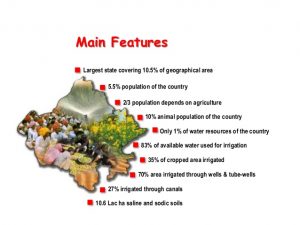Rajasthan Agriculture
Agriculture and allied sector continues to be the backbone of the State’s economy and endures to be the large contributor of the GSDP. 75 per cent population of the State resides in the rural areas and about 62 per cent depend on agriculture and allied activities for their livelihood. Agriculture and allied sector activities primarily refers to Crops, Animal Husbandry, Fisheries and Forestry. There are a large number of agro based industries which can provide vast employment opportunities to people who would thus be in a position to produce wealth and contribute to the development of the State.
- A significant portion of the economy of Rajasthan is agrarian. The agricultural sector of the state accounts for 22.5 per cent. The arid state which receives not more than an annual income of 25 cm thrives on agriculture that is done with irrigation systems and painstaking efforts of the poor farmers of Rajasthan. As a major portion of the state is parched and infertile, agriculture becomes very difficult.
- Rajasthan is the largest producer of barley, mustard, pearl millet, coriander, fenugreek and guar in India.Ramganj Mandi in Kota district is the Asia’s largest mandi or market of coriander. Rajasthan produces over 72% of guar of the world and 60% of India’s barley. Rajasthan is major producer of aloe vera, amla, oranges leading producer of maize, groundnut. Rajasthan is 2nd in production of cumin, gram and 3rd in seed spices. Rajasthan government had initiated olive cultivation with technical support from Israel.The current production of olives in the state is around 100-110 tonnes annually. Rajasthan is India’s second largest producer of milk. Rajasthan has 13800 dairy co-operative societies.
- The total cultivated area of the state encompasses about 20 million hectares and out of this only 20% of the land is irrigated. Ground water level is available only at a depth of 30 to 61m. Rajasthan farmers have to depend on different sources of irrigation that include tube wells, wells and tanks. The Punjab Rivers in the north, the Narmada River in the south and the Agra Canals from Haryana and Uttar Pradesh provide water to the dry land of Rajasthan. Northwestern Rajasthan is irrigated by the Indira Gandhi Canal.
- Rajasthan has two principal crop seasons-
- Rabi
- Kharif
- The Rabi crops are winter crops and are sown in the months of October and November and are harvested in the months of March and April. The principal Rabi crops are Barley, Wheat, Gram, Pulses and Oil Seeds. The major oil seeds are Rape and Mustard.
- The Kharif crops are the crops that are grown in the summer season and are seeded in the months of June and July. These crops are harvested in the months of September and October and include Bajra, Pulses, Jowar, Maize and Ground Nuts.
- The regions that are highly irrigated or receive abundant water supply are utilized for the cultivation of improved high-yielding varieties of rice.
- Some places of Rajasthan that has black soil nurture the growth of major cash crops like Cotton. In some regions Tobacco is also grown.
- Apart from this crops an assortment of fruits and vegetables are also grown in Rajasthan in the local gardens and some fertile regions. These fruits include Oranges, Guavas, Lemon, Pomegranates and Mangoes.
- Rajasthan soil is also suited for the growth of some spice plants, especially red, hot chilies. These chilies give Rajasthan its distinct flavor. Other spices are cumin seeds and methi.
Productivity (kg\ha) of Agricultural crops
Crops 1991-92 1997-98 2002-03 2007-08 2015-16 (Final) to 2001-02 to 2006-07 to 2011-12
(Average) (Average) (Average)
Cereals 835 1189 1294 1617 1791
Pulses 324 472 407 481 515
Food grains 707 991 1058 1291 1411
Oilseeds 762 866 1086 1144 1140
Sugarcane 43871 46184 51707 61432 86511
Cotton 303 337 286 428 461
Gaurseed 131 221 277 409 464
Global Rajasthan Agritech Meet (GRAM)
Global Rajasthan Agritech Meet was successfully organized from 9th to11 November, 2016 at Jaipur Exhibition and Convention Centre (JECC), Sitapura, Jaipur. During the event, 38 MOUs worth `4,400 crore have been signed for an investment in agriculture and allied sectors. Representatives of Netherlands, Iran, Kazakistan, Papuaanugini, Nigeria, Japan and other countries participated in the event besides the Israel participated as the partner country. Approximately 58,000 farmers participated in the event. During the event 5 conferences/ seminars were organized and 4 sessions at three places of Jajam Chaupal under the chairmanship and cochairmanship of central government/ state government ministers and renowned persons of sector concerned were also organized. All the participants including farmers, businessmen, academicians, scientists, students, educationists, researchers, etc accepted the usefulness of the techniques shown in the exhibition about agriculture,smart farm, animal husbandry and dairy sectors.
AGRICULTURE MARKETING
In order to provide better marketing facilities and adequate returns on farmers produce, the Directorate of Agriculture Marketing is functioning in the State to implement ‘Mandi Regulation and Management’ effectively.
Under ”Rajeev Gandhi Krishak Sathi Yojana” financial assistance for farmers /agricultural labourer and hamals have been increased from `1 lakh to `2 lakh in case of work side accidental death. `26.22 crore have been distributed to 1,938 farmers during the year 2016-17 upto December, 2016. “KisanKaleva Yojana” has been introduced for farmers to provide them quality food on subsidized rates in ‘Super’, ‘A’ and ‘B’ class krishi upaj mandi samities of the State. 19.16 lakh farmers and labourers have taken food in the market yards at subsidized rate from April to December, 2016. Oil testing labs have also been functioning in 21 selected krishi upaj mandi samities. During the year 2016-17, expenditure of `310.13 crore has been incurred on construction of mandi yards and roads etc., out of which `185.69 crore have been spent on construction of mandi yards, `124.44 crore on roads and its repairing upto December, 2016. Eight Agmark labs are being operated by the
Agriculture Marketing Department.
